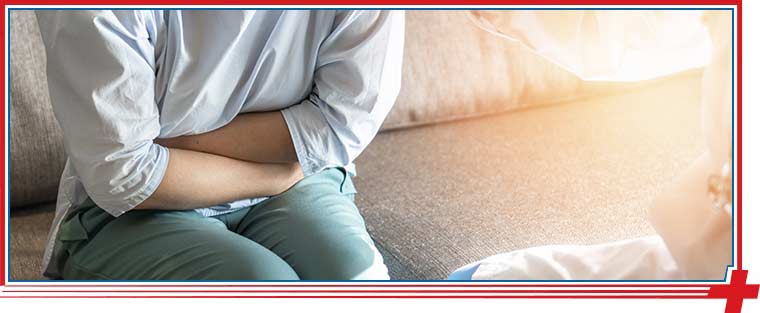Irritable Bowel Syndrome (IBS) Treatment Q&A
IBS is a common disorder. You are not alone and treatments are available at our clinic. Call our team of healthcare professionals today at Fast Aid Urgent Care or join the virtual line. We also accept walk-ins. We have convenient locations to serve you in Bulverde Rd San Antonio TX, Bastrop TX, Alamo Ranch San Antonio TX, La Grange TX, Leon Springs San Antonio TX, New Braunfels TX, Potranco Road San Antonio TX, Dripping Springs TX, Lemon Creek Boerne TX, and Belle Chasse LA.




Table of Contents:
What is irritable bowel syndrome (IBS)?
What is the main cause of irritable bowel syndrome?
What happens if IBS goes untreated?
How do you treat IBS?
Irritable Bowel Syndrome, or IBS, is a common disorder characterized by chronic irritation of the large intestine. This functional gastrointestinal disorder is divided into three subtypes: IBS-C with constipation-predominant symptoms, IBS-D with diarrhea-predominant symptoms, and IBS-M, which is a mixed presentation of the two opposing symptoms.
The primary complaints associated with Irritable Bowel Syndrome are cramping, abdominal pain, bloating, gas, diarrhea, and constipation. Cramping, pain, and bloating with IBS are usually experienced in the abdomen’s lower half. You may notice the appearance and frequency of your bowel movements change.
Patients have reported increased mucus passed with a stool that may have a whitish color. Your stool also may have a greenish or yellowish discoloration, though this sign is more related to nutritional intake rather than a direct effect of IBS. This disorder may become apparent between the late teens to early 40s and is twice more likely to occur in women than men.
While it is not hereditary, your chances of having IBS increase with higher prevalence in the family. For the most part, symptoms of IBS can be regulated with lifestyle and dietary changes.
The main causes of irritable bowel syndrome can be broken down into three categories: dysmotility, visceral hypersensitivity, and dysfunction of the brain-gut pathway. Dysmotility refers to the irregular movement of the bowel; dys- meaning difficulty, and motility implies the ability to move independently. Long, muscular, tubular structures in the human body use the “peristalsis” physiological function to move things along.
Peristalsis is a wave-like contraction of the muscular tube, effectively pushing and squeezing contents through. This occurs in many body structures, though it is most notable in the esophagus and intestines. When you eat food, it passes through the esophagus, the stomach, and the intestines to be ingested and expelled out of the rectum. Immediately after the stomach, food contents enter the small intestine, where most food breakdown, or digestion, occurs.
Once in the large intestine, the primary goal of digestion is to absorb and secrete water, perfecting the consistency for an effective bowel movement. Peristalsis can occur too much or too little with dysmotility, causing IBS symptoms. If bowel movements pass through the gastrointestinal tract too slow, more water may be reabsorbed into the body, resulting in hardy, drier stool, and possible constipation.
On the opposing side, if a bowel movement passes through the GI tract too fast, the body will not have enough time to absorb as much water, creating diarrhea. More muscular peristalsis contractions can also cause gas and bloating. Further, the number of healthy gut bacteria naturally present is thrown off during bouts of diarrhea and constipation, which can cause worse symptoms.
If you have too little gut bacteria or an imbalanced composition, you may experience constipation. Alternatively, if you have too much gut bacteria, it may lead to diarrhea. Visceral hypersensitivity is another cause of IBS symptoms. This refers to the increased sensitivity of the intestinal nerves. Symptoms such as bloating, gas, or cramping can feel more painful for patients with IBS due to their hypersensitivity.
Lastly, the brain-gut refers to a powerful and complex neural connection that allows the brain to communicate with the GI tract. If the communication between the two is hindered or faulty, the gut will not act as it should and could “overreact” to certain foods, drinks, and medication. Because of this, stress and anxiety are strongly linked to digestion issues and worsening symptoms.
IBS is a functional disease, meaning the associated body structure (such as the GI tract) is normal, though they are still dysfunctional and result in persistent symptoms. IBS does not lead to more issues, nor does it increase your risk for obtaining other diseases. While some may believe IBS makes you more likely to develop colon cancer or colitis, this is untrue.
If IBS goes untreated, your symptoms will likely persist and increase in severity, but nothing new will come from the syndrome. It is essential to contact your doctor if you experience specific symptoms, such as unintentional weight loss due to decreased appetite or diarrhea during the night. Rectal bleeding, vomiting, difficulty swallowing (dysphagia), or persistent pain that isn’t relieved by passing gas or a bowel movement should be brought to the attention of your physician.
While IBS won’t directly cause any new issues, it can have some complications if long-term symptoms persist. For example, if you experience flares of diarrhea or constipation, it may lead to hemorrhoids. Mood disorders, such as anxiety and depression are also heavily associated with GI disorders due to the strong connection between the gut and the brain. If your IBS symptoms disallow you from enjoying experiences or relationships, you may experience a lower quality of life.
Your treatment options can vary depending on the IBS you have, IBS-C, IBS-D, or IBS-M. Overall, most patients with IBS can manage their symptoms with lifestyle and diet changes. Many patients with
IBS have reported using a food journal to be highly effective in tracking and determining symptom trends. Though gluten sensitivity is more known in celiac disease, reduction in gluten intake anecdotally alleviates IBS flare-ups.
The most effective nutrition plan for IBS, however, is FODMAP. FODMAP stands for fermentable oligosaccharides, disaccharides, monosaccharides, and polyols, a group of sugars (carbohydrates) known to cause intestinal disruption. This temporary and restrictive diet is used to help determine specific foods that are problematic for the patient. Once you’ve stopped eating “high FODMAP” foods, you may slowly reintroduce them to see how your body reacts.
Food restrictions include dairy-based products, wheat-based products, beans, lentils, certain vegetables (onions, garlic), and fruits (apples, peaches). Foods that are considered “low FODMAP” include eggs, meat, specific cheese (ex. brie), nut milk, and again specific vegetables (eggplant, zucchini) and fruits (grapes, blueberries).
It is also recommended that patients with IBS keep up their fluid intake and begin taking fiber supplements or eating high-fiber foods. If all else fails, there are medications specific to IBS and non-specific that can help. Laxatives or antidiarrheal medications may be used to alleviate your predominant IBS symptoms. Anticholinergic drugs can help reduce spasms of the large intestine.
Pain relievers and various antidepressants can minimize the pain that your symptoms bring on, such as cramping or bloating. Medications specific to IBS have been made and tested, though they are mostly only used in worst-case scenarios as they have numerous side effects and can increase the risk for other conditions. Also, since the IBS community is predominantly women, many of these medications have not been approved for use by men.
At Fast Aid Urgent Care, we strive to answer all of your questions and deliver a treatment care plan specific to your individual needs. We are ready to perform diagnostic testing and fully collaborate with you to determine and alleviate your biggest concerns. If you would like to speak to a doctor, do not hesitate to give us a call or join the virtual line by phone. We serve patients from Bulverde Rd San Antonio TX, Windcrest TX, Selma TX, Bastrop TX, Paige TX, Smithville TX, Alamo Ranch San Antonio TX, Leon Valley TX, Helotes TX, La Grange TX, Rabbs Prairie TX, Halsted TX, Leon Springs TX, Fair Oaks Ranch TX, Cross Mountain TX, New Braunfels TX, Hunter TX, Zorn TX, Potranco Road San Antonio TX, Rio Medina TX, Rolling Oaks Estates TX, Dripping Springs, TX, Saddletree Ranch TX, Belterra TX, Lemon Creek Boerne TX, Scenic Oaks TX, Fair Oaks Ranch TX, Belle Chasse LA, Timberlane LA, Woodmere LA, and surrounding areas.

Additional Services You May Need
▸ Urgent Care
▸ Walk-in Family Care
▸ Children’s Health
▸ Sports Physicals
▸ DOT Physicals
▸ Pediatric Urgent Care
▸ Immunization

Additional Services You May Need
▸ Urgent Care
▸ Walk-in Family Care
▸ Children’s Health
▸ Sports Physicals
▸ DOT Physicals
▸ Pediatric Urgent Care
▸ Immunization





